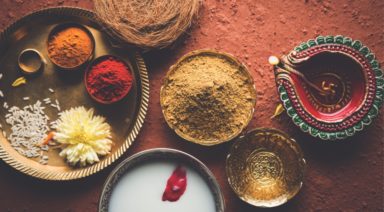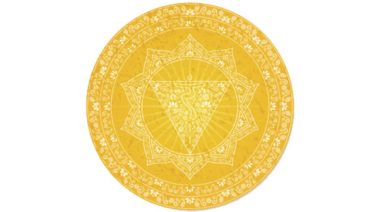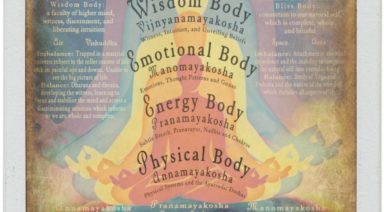Studies Show Mantra Repetition Has Measurable Healing Effect

New studies show that repeating sacred sounds can have a powerful effect on your health and well-being.
The practice of mantra, or the repetition of sacred sounds, has been an integral part of many spiritual traditions throughout the ages. Today, exciting new research is scientifically validating the profound psychological and physiological benefits of this ancient practice.
Dr. Shamini Jain is a leader in the emerging field of biofield science and author of “Healing Ourselves.” She knows mantra repetition to be a highly effective tool for consciousness expansion and healing.
“Sometimes we get so bogged down in the conditioned mind that we find it harder to reach our spirit,” Jain said. “So, mantra is a tool for us to reach our spirit, whether we call that ‘God,’ ‘deep consciousness,’ ‘higher self’ — there are many names for it, but it’s really a technique for transcending the mind. And it can be something that’s spoken out loud, literally like repeating a word out loud, it can also be something that we repeat silently. It can also be sung, and many traditions — almost all global traditions really — have some type of practice where they utter sacred sounds.”
In ancient traditions, the primary function of mantra was to connect with the divine.
“In these traditions, there was a deep relationship of sound with consciousness. Working with mantras in these ancient traditions, it was leading you to expand your consciousness so that you can be in better contact with divinity,“ Jain said.
With the growing interest in studying these ancient systems, scientific research is now starting to explore the ways in which mantras may affect the body and mind. One recent focus of study has been on the effect of mantras on psychological conditions.
“There is a body of literature that has been published, for example by Dr. Jill Bormann at University of California San Diego, and she examined what they called “mantram” repetition, which was essentially the uttering of a sacred sound,” Jain said. “They’ve done studies, for example with veterans with PTSD, showing reductions in PTSD symptoms for those who repeated a sacred word or phrase, compared to just repeating something that had no spiritual meaning.”
Other recent studies are showing the effect of mantra on physiological markers of health.
“Some of the strongest data that we see with mantra practice is the effect on the heart,” Jain said. “So we actually see that practicing different forms of mantra, whether it’s Buddhist, Hindu, or other traditions, has an effect on reducing blood pressure and improving cardiovascular health. There are some studies also looking at this in terms of heart rate variability, which is really the dynamic dance of your autonomic nervous system. Any way you look at it, the data are pretty clear that mantra meditation has a profound effect on heart health.”
Yet another groundbreaking study has shown that mantra repetition in the form of kirtan, or call-and-response singing, has an effect on cell aging.
“They found not only reductions in mental and emotional suffering, such as stress and other factors, they found increases in markers of cell aging. Specifically, they saw shifts in an enzyme called telomerase, which helps to protect our cells against aging,” Jain said.
While the healing effects of mantra practice are clear, scientists are working on understanding the mechanism behind which this works. One fascinating recent study looked closely at brain function.
“In terms of the brain, a really interesting study that was published in a top-tier journal Nature Scientific Reports, looked at the effects of Buddhist meditation and chanting particularly, compared to just chanting regular words,” Jain said. “Interestingly what they found was, first of all, the chanting of the Buddhist words by these people who were just being trained in how to do it, resulted in increased delta waves. Enhanced delta wave activity has been found in many forms of meditation. Those increased delta waves in the brain seem to be connected to the meditator’s — in this case, the chanter’s — experience of an expanded sense of self that was beyond conditioning.”
As there are many ways to practice mantra, Jain recommends finding a tradition that you resonate with and an experienced teacher to guide your practice. She has high hopes that scientific interest in mantra continues and deepens.
“There needs to be more research in mantra meditation, specifically integrating some of the perspectives from the spiritual practitioners, as well as things like brain changes. A lot of these practices were really meant for us to have whole-person well-being, which means spiritual, physical, emotional, social, (and) relational. So that’s the type of research we want to see with mantra meditation. We’re not just looking at one brain factor, but we’re really looking at the whole person,” Jain said.
How Mantra Transports The Mind's Awareness to the Heart

In 2006, I enrolled in yoga teacher training. They sat us in a circle of 20 people and asked us to say our names and something fun about ourselves. My mouth got dry, my armpits started sweating, and like many introverts who are shy about public speaking, I waited to go last. By the time it was my turn, the nerves had totally built up.
I gave a terse introduction, all the while speaking through a shaky voice as I felt the nervous sweat dripping down my body. I realized I was terrified of speaking in front of my peers and loathed having all eyes on me. That evening I visited the leader and told him I was quitting teacher training.
It’s 2021 now and I can say honestly I’m glad he didn’t let me, but I am still, to this day, fearful of public speaking. During the first class I ever taught I received a comment card saying I had a robotic voice! But my motto ‘fake it until you make it’ one day turned into ‘fake it until you become it.’ That’s why I chose to continue to master my trade and teach yoga full time.
In 2009, I trained with Janet Stone at her very first teacher training where we sang and sang. I was introduced to the power of mantra. Maybe I loved it because I am half Filipina and lived in the Philippines—Filipinos love to sing! Maybe it was because my Dad, as a diplomat, played karaoke songs when I was little and I knew all the words to New York, New York by 5th grade. Ever since the training, mantra has been my savior.




































